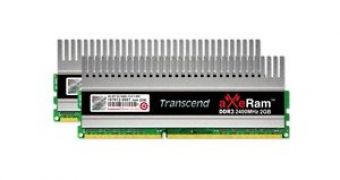While some might think that the emergence of a new product type would generally boost sales of all sorts of components, this does not seem to be the effect that tablets have on the memory market.
As some may know, the DRAM industry hasn't been going through the best of times.
In fact, oversupply has been a problem for months, so prices have been falling almost constantly, unlike NAND chips, which at least managed a rebound.
Among the consequences of this oversupply of random access memory is OCZ's decision to completely back out of this segment and focus on SSDs instead.
Now, Transcend is said to have stated, according to a Digitimes report, that tablets are actually doing more harm than good on the memory front.
Certainly, oversupply can be partially blamed on the high yield rates of manufacturers, and their rapid transition to more advanced processes over the course of 2010.
Tablets, unfortunately, have now become another factor in the continued strained situation, because DRAM chip consumption shrinks as more slates are shipped.
In fact, even though mobile RAM isn't doing as bad as one might fear, standard DRAM does have the problems of not addressing any applications expected to grow, marketing-wise, any time soon.
The so-called silver lining is that, while prices are unlikely to grow during the first half of 2011, at least DRAM doesn't have that much room to become any cheaper, especially now that DDR3 quotes are almost as low as manufacturing costs.
Meanwhile, chip producers that have not yet transitioned to 40nm processes will have to do so as soon as possible, since it is imperative that they gain the ability to make cheaper 2 Gb chips.
All in all, according to Transcend's chairman Peter Su, the DRAM oversupply should not be blamed on just the supply side and will probably persist for months to come.

 14 DAY TRIAL //
14 DAY TRIAL //